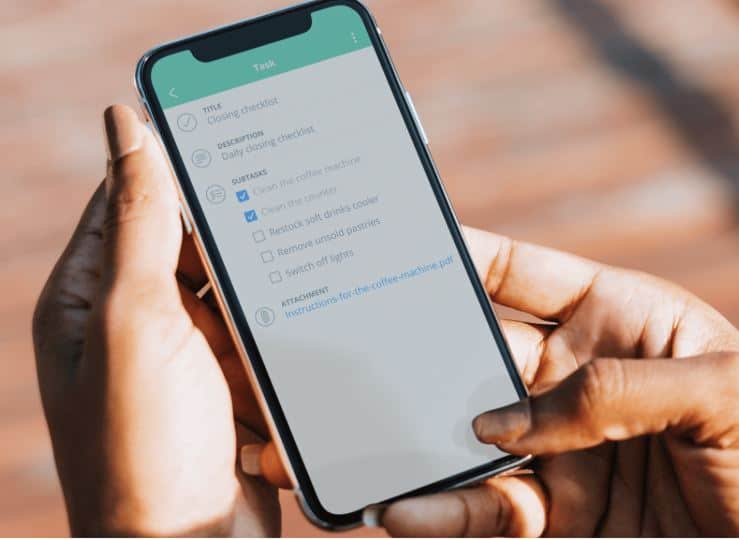The 37 Best Restaurant Interview Questions
Discover 37 restaurant interview questions that help you avoid the canned answe...

An oft-forgotten component of an effective hiring process is interview feedback.
Whether you keep this information for internal use only or present it to the candidate at the end of the meeting, your thoughts and feelings about how the interviewee can improve are an invaluable resource for all parties involved.
In this article, the workforce-management experts at Sling discuss interview feedback in its entirety, offer tips for an effective delivery, and provide a powerful way to supercharge the experience for both the interviewer and the interviewee.

Interview feedback is that it is a great way to keep track of what you liked and didn’t like about the interview, the candidate, or the hiring process as a whole. Viewed from that perspective, interview feedback is the perfect tool to improve your HR processes from the inside out.
Another way to look at interview feedback — and the way we’ll focus on in this article — is as a vehicle for describing what the interviewee did well and what they can improve on in the future.
From an internal point of view, written feedback is an ideal way to create a detailed picture of how the candidate performed during the interview and whether or not they seem like a good fit for your company.
Underneath it all, these types of notes help you weigh the pros and cons of each candidate — especially when you have to compare them to one another.
Your human resources department can also use feedback from a hiring meeting to understand the process as a whole and where they can make improvements. You may even go so far as to ask for interview feedback from the candidate about how they felt the meeting went.
All of that taken together can be invaluable for your business.
From the interviewee’s point of view, feedback gives them helpful information about their performance that they can then use to make changes for the next time around (whether that’s with your business or not).
With your input and a bit of honesty and humility on their part, a job candidate can learn a lot about themselves and the way they interview. That insight can mean the difference between getting a job and not.

When you’re evaluating a candidate for a job opening, there’s more involved than just deciding if they’re capable or not. Other factors come into play.
The same is true for providing interview feedback. As the interviewer, you want to pay attention to — and critique — such factors as:
Let’s discuss a few of these points in a bit more detail so you know how to formulate your feedback on the subject.
If a candidate is lacking in education somehow — even just slightly — let them know during your feedback.
If they want to continue interviewing for jobs similar to yours, perhaps they’ll consider taking a class or two to round out their CV.
In many ways, experience is as important as — if not more than — education. Let the candidate know if theirs is lacking so they can take steps to improve.
Body language is very often an unconscious behavior that an individual doesn’t know they exhibit.
If the interviewee has a tendency to fidget, break eye contact, slouch, or something else that doesn’t contribute to the meeting, let them know so they can work on it.
Communication is a big part of working with a team and collaborating with others.
If the interviewee has a hard time making themselves clear when it’s just the two of you, provide some feedback so they know that’s where they’re lacking.

When delivering feedback, sandwich one or two opportunities for improvement between positive commendations.
Start with a few positive pieces of feedback, move to performance aspects that the interviewee needs to work on, and then end with more positive encouragement. That way, their weaknesses don’t overshadow their strengths.
If your comments are too general, you leave the individual confused about where they need to improve. Make your feedback specific and to the point to remove the potential for confusion.
For example, don’t say, “You need to improve your answers to questions about your experience.” That’s too general.
Instead, say something like, “I would appreciate more detail on how your experience from your last job would help us solve problems in our company.”
You can also be specific on what you liked about their interview responses. That will help them know what to keep and what to change.
Honesty is the best policy, so don’t be afraid to provide an open critique in your interview feedback.
Resist the urge to sugarcoat your assessment or beat around the bush in order to save their feelings.
People will know when you’re being overly flattering, and the interview process is hard enough without making your potential hires decipher what you’re trying to say.
The words you use are just as important as the message you’re trying to communicate. That’s why it’s vital to be tactful and use the right language.
Be as clear and specific as possible without sounding trite and insincere. Avoid general terms such as “good,” “great,” and “excellent.” Opt instead for action words like:
These types of words are more descriptive and, therefore, more meaningful.
It’s also a good idea to create a list of strength and weakness phrases for common parts of the feedback process so you’re prepared when the time comes.
With a list of strength and weakness phrases on hand when you conduct an interview — be it written or face-to-face — you can be as descriptive as possible.
Just be sure to elaborate on the phrases you choose so that the interviewee has a clear idea of what you mean.
Resist the urge to allow personality traits to overshadow behavior when delivering interview feedback. Instead, focus on performance so that the interviewee doesn’t take offense, and they know exactly what they need to do to improve.
For more insight on what to say and not say, take a few moments to read our article Performance Appraisal Phrases: 200 Helpful Phrases For Employee Performance Reviews.

Not every employer takes the time to provide interview feedback, but you can stand out from the rest by setting aside a few minutes at the end of the allotted time to discuss how the interviewee did.
Communication such as this goes a long way toward forging a strong employee/employer relationship. Even if you don’t end up hiring a candidate, without a doubt, they’ll appreciate hearing how they can improve their interview skills.
Sling can help. Our software suite of workforce management and optimization tools makes it easy to schedule feedback time so that you don’t neglect it with your next candidate.
And that’s just the tip of the Sling iceberg. The Sling app also helps you:
The on-board artificial intelligence (A.I.) even keeps track of time-off requests, work preferences, and other employee information.
If you double-book an employee or schedule them for a time they can’t work, the Sling A.I. will notify you and prompt you to make the necessary change.
Regardless of the industry, Sling can keep you and your team members organized and focused on the project at hand. Ultimately, that will help busy managers find more time to provide interview feedback to their interviewees.
Experience the myriad of ways the Sling app can improve the way your business operates by signing up for a free trial today.
For more free resources to help you manage your business better, organize and schedule your team, and track and calculate labor costs, visit GetSling.com today.
See Here For Last Updated Dates: Link
This content is for informational purposes and is not intended as legal, tax, HR, or any other professional advice. Please contact an attorney or other professional for specific advice.
Schedule faster, communicate better, get things done.